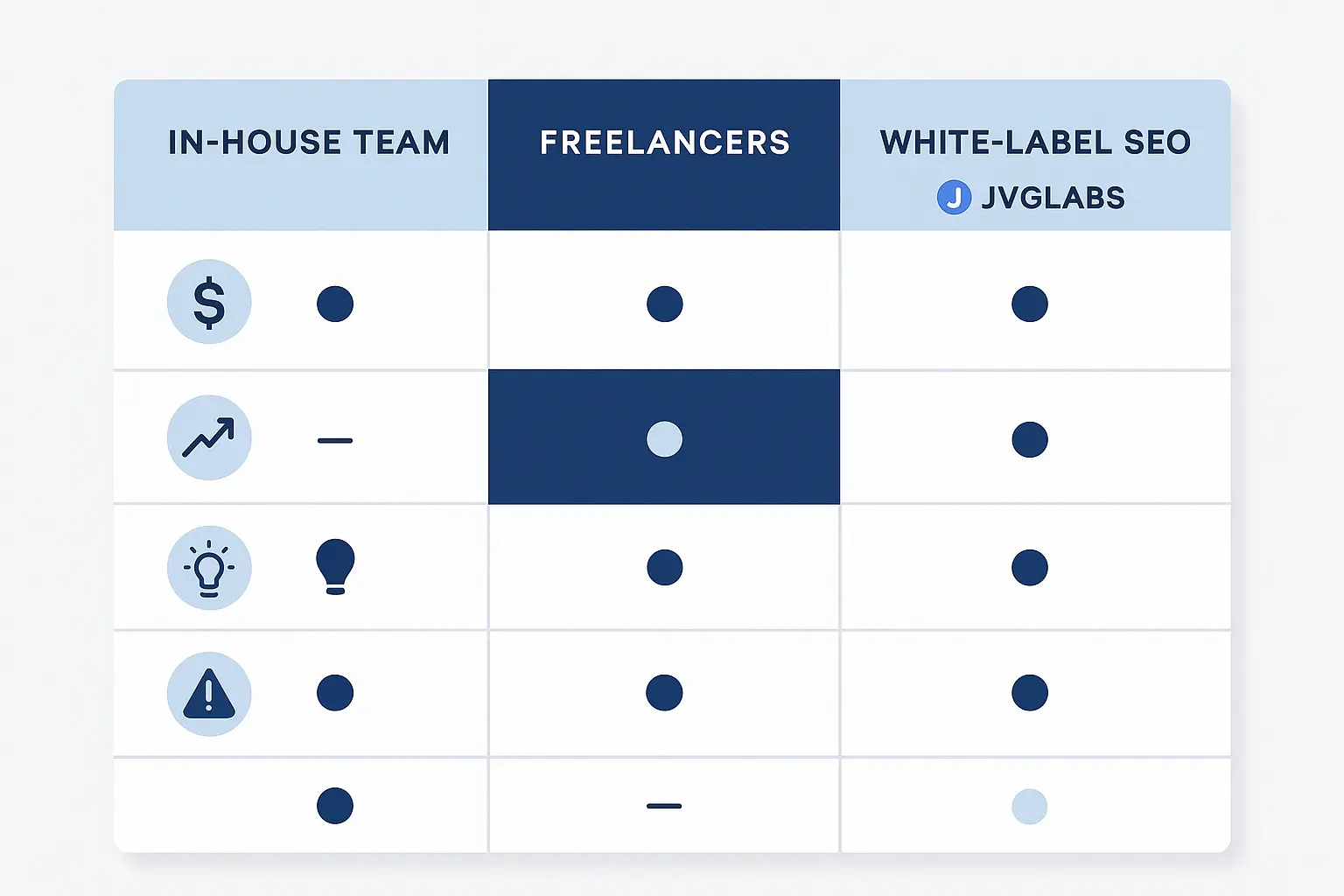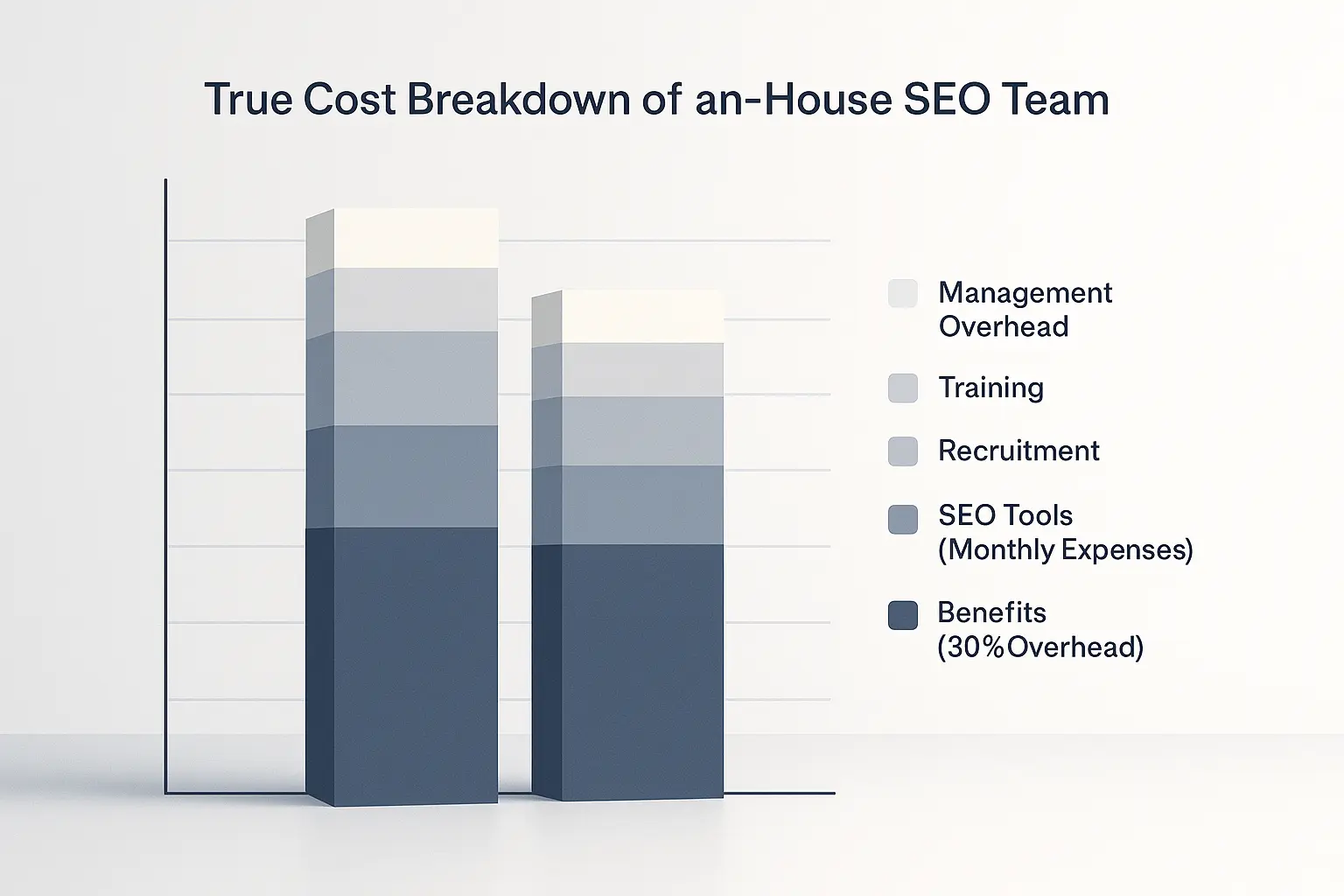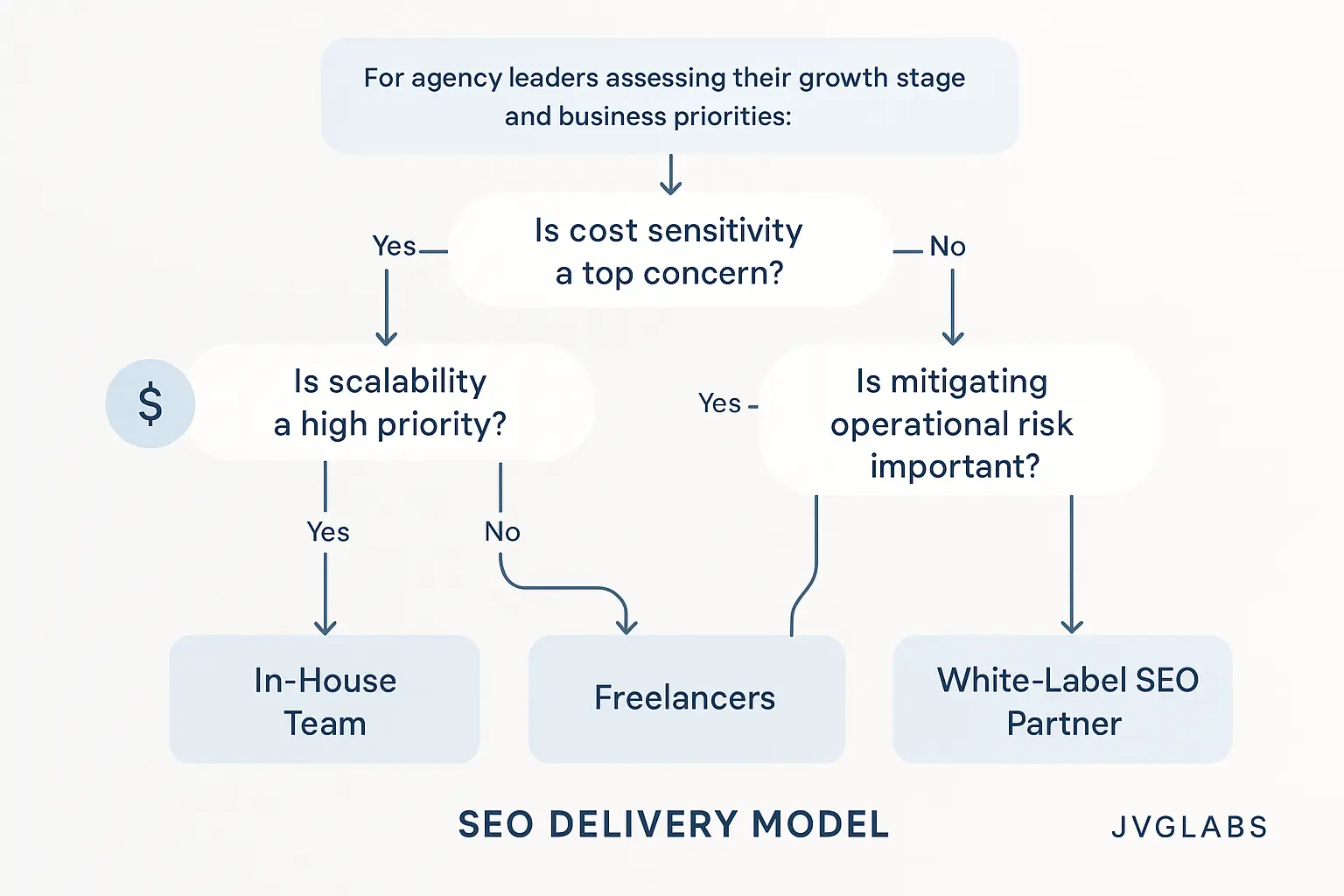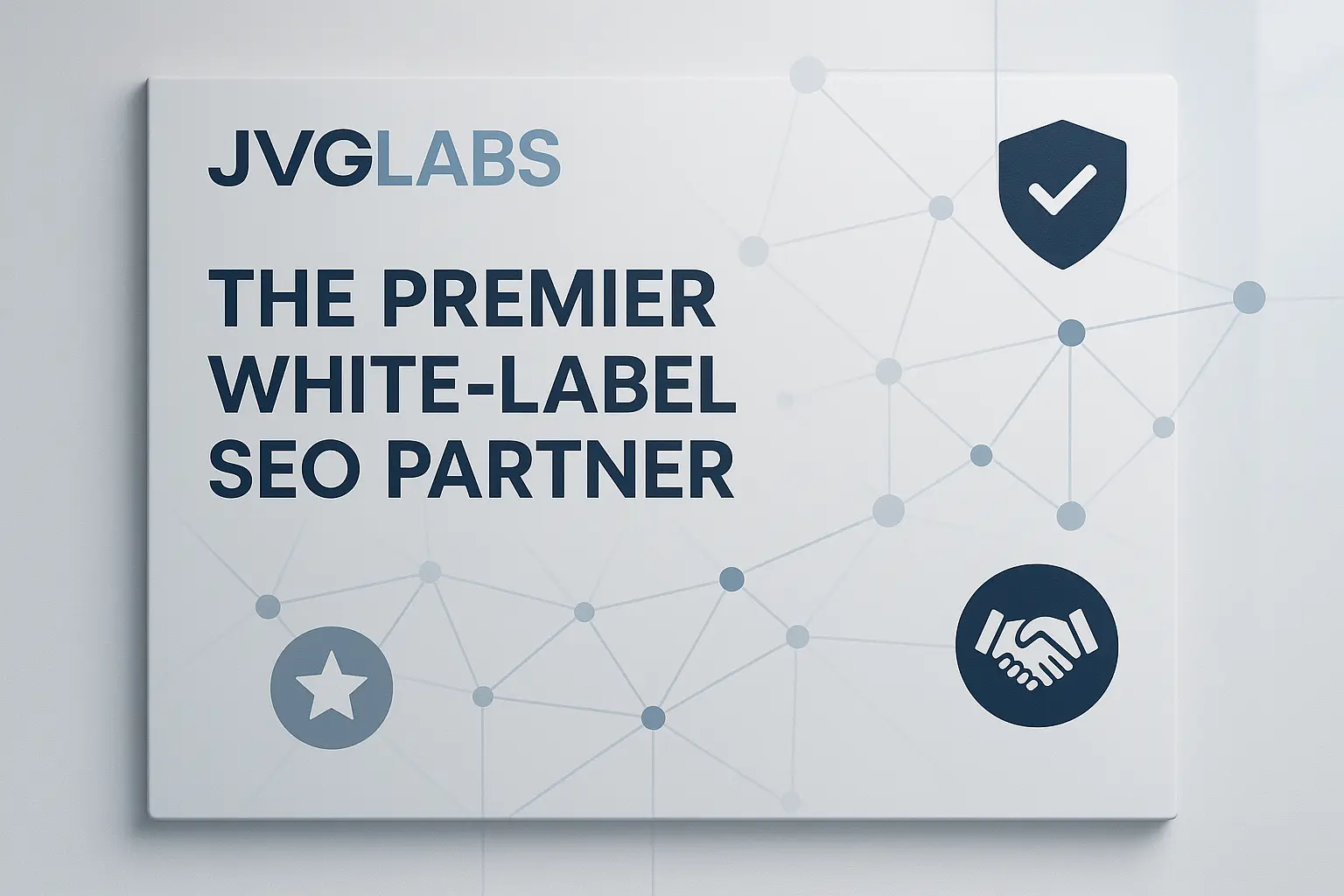For agency leaders, growth creates a critical challenge. As client demand for SEO rises, scaling your delivery becomes more complex. Do you build an in-house team and take on massive overhead? Piece together a network of freelancers and risk inconsistency? Or find a partner to power your growth behind the scenes?
This isn’t just an operational question—it’s the central strategic decision that will define your agency’s profitability, scalability, and future. The right choice unlocks new revenue streams and lets you focus on client relationships; the wrong one leads to burnout, shrinking margins, and stalled progress.
This guide offers a clear framework for making that decision. We’ll move beyond a generic pros and cons list to analyze the true costs, risks, and strategic advantages of each model, empowering you to choose the path that best aligns with your agency’s ambitions.
Executive Comparison Matrix: The Three Models at a Glance
Before diving deep, here’s a high-level look at how each SEO delivery model stacks up on key factors: cost, scalability, expertise, and risk.
This chart provides a quick snapshot, but the real story lies in the numbers—especially the hidden ones.

The Financial Deep Dive: Uncovering the True Cost of an In-House Team
Many agencies underestimate the true cost of an in-house SEO team. An SEO manager’s salary is just the tip of the iceberg; the full financial picture reveals a much larger investment.
Industry data shows that a basic in-house team can easily cost $200,000 to $400,000 annually. That figure doesn’t just cover salaries—it’s the fully-loaded cost of ownership.
Let’s break it down:
- Salaries: While it’s the most obvious cost, finding and retaining top talent in a competitive market is expensive.
- Benefits and Overhead: Expect to add another 30% of salary costs for benefits, taxes, insurance, and office space.
- Recruitment: Factoring in recruiter fees and the time your own team spends interviewing adds thousands to each hire.
- Essential Tools: A professional SEO toolkit (Ahrefs, Semrush, Screaming Frog, reporting software) runs $500 to $2,000 per month, a cost that scales with your team.
- Training and Development: SEO changes constantly. Your team needs a dedicated budget for conferences, courses, and certifications to stay effective.
- Management Overhead: A senior team member must dedicate significant time to managing, mentoring, and directing the SEO team—time that can’t be spent on strategy or client relationships.
Add it all up, and the financial barrier becomes clear. This high fixed cost makes it difficult to scale profitably, putting immense pressure on your agency to maintain a full client pipeline just to cover expenses.
Comparing Your Options: Three Models for SEO Delivery
With the true costs in mind, let’s see how each model performs in the real world.
Model 1: The Fortress (The In-House Team)
Building an in-house team is like constructing a fortress. It gives you maximum control and deep integration with your agency’s culture, but it’s expensive to build and slow to adapt.
When it works best:
For large, established agencies with predictable client loads and the capital to invest heavily in talent, an in-house team can foster deep brand knowledge and seamless collaboration.
The strategic limitations:
- High Fixed Costs: The $200k+ annual cost is a constant, regardless of your client workload. This creates significant financial risk during slower periods.
- Scalability Bottlenecks: Need to double your capacity? You face the slow, expensive hiring process all over again and can’t scale up or down quickly in response to demand.
- Talent Gaps: Modern SEO requires a diverse skillset—technical analysis, content strategy, link building, local SEO, analytics. It’s nearly impossible to find one or two people who are true experts in everything.

Model 2: The Specialist (The Freelancer Network)
Using freelancers is like hiring specialists for specific missions. This approach offers flexibility and can be cost-effective for isolated tasks, but managing the operation can quickly drain your resources.
When it works best:
For agencies needing a specific, one-off task completed—like a technical audit or a single content piece—a trusted freelancer can be a great resource.
The strategic limitations:
- Management Complexity: Juggling multiple freelancers for different clients and different tasks creates a significant administrative burden. You become a project manager instead of a strategist.
- Inconsistent Quality and Reliability: Freelancers vary widely in skill and professionalism. A great writer may not understand technical SEO, while a technical expert may not be a strong communicator. This inconsistency puts your client relationships at risk.
- Limited Scalability: A single freelancer can only handle so much work. As your agency grows, you’ll find yourself constantly searching for and vetting new talent, with no guarantee of quality.

Model 3: The Growth Engine (The White-Label Partner)
A true white-label partner acts as your invisible SEO department. It’s a strategic alliance designed to give you the expertise and scalability of an enterprise-level in-house team without the associated costs and complexities.
This model is fundamentally different. Instead of hiring an employee or a contractor, you’re integrating a complete delivery system into your agency. Research from Digital Leap Marketing confirms that outsourcing can save agencies 30-70% compared to building an in-house team.
When it works best:
For growth-focused agencies that want to deliver high-impact SEO services profitably and at scale. It’s ideal for specialized firms looking to expand capacity and for full-service agencies wanting to add SEO to their offerings without the risk.
The strategic advantages:
- Immediate Scalability: Onboard five new clients tomorrow? Your white-label SEO partner has the capacity and systems ready to go. You can grow without limits.
- Predictable, Scalable Costs: You move from high fixed overhead to a variable cost model. Costs are tied directly to client work, typically ranging from $500 to $2,000 per client per month, which protects your profitability.
- Access to a Full Team of Experts: You instantly gain access to technical specialists, content strategists, link builders, and analytics experts without the cost and complexity of hiring them individually.
- Focus on Growth: With execution handled, your team can focus on what they do best: strategy, client relationships, and growing the agency.
The primary concern for many agencies is a perceived loss of control. However, a true white-label partner operates as an extension of your team. All deliverables, reports, and communication are branded as your own, keeping you in complete control of the client relationship.

The Decision Framework: Which Model is Right for Your Agency?
Your choice will depend on your agency’s current stage and future goals. This framework can help you identify the best path forward.
- If you are a startup agency or just beginning to offer SEO: A freelancer network can be a low-cost entry point for your first client or two. Just be prepared to switch models as you grow to avoid management bottlenecks.
- If you are a specialized agency at capacity: You’re feeling the pain of success—your current team is overloaded, and you’re turning away business. A white-label SEO execution partner is the ideal solution to break through this growth ceiling immediately.
- If you are a non-SEO agency (PPC, web design, creative): You are likely leaving money on the table by not offering SEO. A white-label partner allows you to add a profitable, in-demand service line overnight without the usual risk and expense of hiring.
- If you are a large, well-funded agency: You may have the resources for an in-house team. However, many large agencies are now adopting a hybrid model: maintaining a core in-house strategist for client-facing activities while partnering with a white-label firm for scalable execution. This “best of both worlds” approach maximizes both control and efficiency.
The trend is clear. The HubSpot 2024 Agency Benchmark Report found that 61% of agencies already outsource at least one core service, recognizing it as a strategic lever for growth.
A Practical FAQ for Agency Leaders
Q: Will I lose control over quality if I use a white-label partner?
A: Not with the right partner. A true white-label provider works as an extension of your team. You set the strategy and own the client relationship. They provide the expert execution in the background, under your brand. Look for partners who offer transparent reporting and a dedicated point of contact.
Q: Isn’t it just cheaper to hire a junior SEO specialist?
A: This is a common misconception. When you factor in the “true cost”—salary, benefits, tools, training, and the senior management time required to train and supervise them—the cost is far greater than the specialist’s salary. What’s more, a junior employee cannot provide the breadth of expertise that a full white-label team can.
Q: How do I vet and choose the right white-label SEO partner?
A: Look for four key qualities:
- Agency-Only Focus: Do they only work with agencies? If so, they understand your business model and are not a competitor.
- Proven Processes: Do they have clear, documented systems for onboarding, execution, and reporting?
- Technology + Expertise: Do they leverage automation to handle scale while relying on human experts for strategy? A platform that combines AI-powered automation with expert oversight is the gold standard.
- Case Studies and Results: Can they show you real examples of client growth achieved through their agency partners?
Why Growth-Focused Agencies Choose a Partner, Not Just a Provider
Ultimately, the decision to build, hire, or partner is a referendum on your agency’s growth strategy. While in-house teams and freelancers have their place, each model comes with fundamental barriers to rapid, profitable scale.
A white-label partner dissolves those barriers, transforming SEO delivery from a costly operational burden into a scalable, predictable growth engine. You get the power of an enterprise-level SEO department, the flexibility of a variable cost structure, and the freedom to focus on building your agency.
At JVGLABS, we’ve built our entire model to be the invisible team behind your brand’s success. By combining AI-driven automation with expert strategy, we empower you to deliver sophisticated, omnichannel SEO that drives real business results for your clients—all under your name.
If you’re ready to scale your agency without the overhead, discover how JVGLABS can become your dedicated SEO growth engine.

